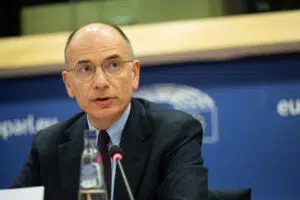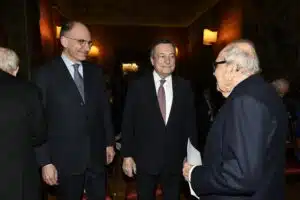Brussels – It’s dress rehearsal before the debut at the European Council. Italy’s former prime minister and president of the Institut Jacques Delors, Enrico Letta, mandated by the Council and Commission to draft the high-level report on the future of the Single Market, presented today (Feb. 22) to the European Parliament’s Committee on Internal Market and Consumer Protection (IMCO) the preliminary recommendations that will be in the report presented to the March 21-22 European Council. “It is necessary to try not only to react to crises ‘on a day-by-day basis,’ we need something different and more ambitious for the future,” Letta began in his speech before MEPs, five months after the first exploratory appointment.

After nine hearings in the European Parliament, meetings with all EU institutions, in the capitals of the 27 member states — “yesterday I was in Copenhagen, next week in Poland” — and with stakeholders, Letta is wrapping up the report. “The angle I would like to take is the geopolitical dimension of the Single Market,” that is, seeking “a different approach than in the past.” Not disowning the inheritance of Jacques Delors but recognizing that “when he began his work, he did it without the full economic dimension of our system,” without what the Italian ex-premier calls “the four pillars that we must put at the center of the Single Market” are defense, telecommunications, energy, and finance: sectors that “until now have seen the national dimension prevail,” but are considered “strategic European assets” in the report for the EU future. Letta strongly emphasized that “if we start with this big change, there will be more integration,” hoping that EU institutions will take up the recommendations. If defense “is the new thing for the next legislature,” energy in the one ending has already proved, especially in the second part, that there can no longer be a delay of European integration in this area. Answering questions from MEPs, Letta focused mainly on the other two pillars of the “geopolitical dimension” of the Single Market, which “is and will remain at the service of citizens.” However, “there are some markets, such as telecommunications, where companies that are too small go against the interests of consumers themselves.” Twenty-four hours after the EU Commission’s White Paper presentation on future challenges in this sector, Letta noted that “a market divided into 27 nationals cannot hold up when we know what the size of the others are.” Compared to “5 million customers for each operator in Europe, there are 460 million in China and 110 million in the United States.” The same is true for financial services, where performance to date is seen as “catastrophic” because “services that are too small in size make consumers, companies, and SMEs turn to the United States.” The goal instead should be “more efficient and better performing EU services.”

From left: former Italian prime ministers Enrico Letta and Mario Draghi, respectively responsible for the high-level report on the future of the Single Market and responsible for the report on the future of European competitiveness
In the preview of the presentation of the high-level report, Letta said that in the event of a change of course, “a shift in scale and speed to answer the big question of how to finance the green and digital transition” can be achieved, but without forgetting the need for a firm cohesion policy “as we enter the most important decade, that of enlargement.” In other words, “cohesion means considering all the problems of our society” and “we cannot separate it from the issue of enlargement.” Not least because these two issues, if forgotten, could disrupt the Single Market itself and the fundamental freedoms of the Union’s citizens. “Freedom to stay and freedom of movement are part of the same dimension,” Letta reiterated, specifying in more detail what was already discussed with MEPs in January. “For some regions and countries when you lose 15 percent of the population in 10 years, ‘brain drain’ is an understatement: it’s more like an expulsion.” The right to move is different from the obligation to move “with often one-way tickets,” and while “mobility remains at the heart of everything in the EU,” the time has come for change, including in preparation for new member states: “We are not ready. Enlargement will probably be the most complex exercise for the next decade.”
But it is already the present that worries Letta. “I am in favor of what was done in recent years on the Green Deal. I was very shocked by the farmers’ demonstrations, but I have learned lessons from these protests,” he confessed to MEPs, speaking of “collective responsibility” in what happened and in the response that needs to be found. If everyone – national and European institutions – goes in the direction of the Green Deal, accepting a “cost of 800 billion euros a year for the next 10 years” and knowing how to guarantee coverage of costs “only for the next two years,” it is inevitable that “every category will say ‘I don’t want to be the one to pay the price.'” The former Italian premier’s warning ahead of the European elections is stark: “If we are unable to give an answer and find solutions, farmers will be only the first category to take to the streets, then others will follow, and a social earthquake will characterize 2024.” EU institutions and member states must give “clear answers to these questions, otherwise people will not wait for the consequences, but will anticipate them, like farmers,” Letta concluded his speech.
English version by the Translation Service of Withub





